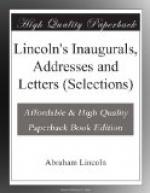Here, then, we have twenty-three out of our “thirty-nine” fathers “who framed the government under which we live,” who have, upon their official responsibility and their corporal oaths, acted upon the very question which the text affirms they “understood just as well, and even better, than we do now;” and twenty-one of them—a clear majority of the whole “thirty-nine”—so acting upon it as to make them guilty of gross political impropriety and wilful perjury if, in their understanding, any proper division between local and Federal authority, or anything in the Constitution they had made themselves, and sworn to support, forbade the Federal Government to control as to slavery in the Federal Territories. Thus the twenty-one acted; and, as actions speak louder than words, so actions under such responsibility speak still louder.
Two of the twenty-three voted against Congressional prohibition of slavery in the Federal Territories, in the instances in which they acted upon the question. But for what reasons they so voted is not known. They may have done so because they thought a proper division of local from Federal authority, or some provision or principle of the Constitution, stood in the way; or they may, without any such question, have voted against the prohibition on what appeared to them to be sufficient grounds of expediency. No one who has sworn to support the Constitution can conscientiously vote for what he understands to be an unconstitutional measure, however expedient he may think it; but one may and ought to vote against a measure which he deems constitutional if, at the same time, he deems it inexpedient. It, therefore, would be unsafe to set down even the two who voted against the prohibition as having done so because, in their understanding, any proper division of local from Federal authority, or anything in the Constitution, forbade the Federal Government to control as to slavery in Federal territory.
The remaining sixteen of the “thirty-nine,” so far as I have discovered, have left no record of their understanding upon the direct question of Federal control of slavery in the Federal Territories. But there is much reason to believe that their understanding upon that question would not have appeared different from that of their twenty-three compeers, had it been manifested at all.
For the purpose of adhering rigidly to the text, I have purposely omitted whatever understanding may have been manifested by any person, however distinguished, other than the thirty-nine fathers who framed the original Constitution; and, for the same reason, I have also omitted whatever understanding may have been manifested by any of the “thirty-nine” even on any other phase of the general question of slavery. If we should look into their acts and declarations on those other phases, as the foreign slave-trade, and the morality and policy of slavery generally, it would appear to us that on the direct question of Federal control of slavery in Federal Territories, the sixteen, if they had acted at all, would probably have acted just as the twenty-three did. Among that sixteen were several of the most noted anti-slavery men of those times,—as Dr. Franklin, Alexander Hamilton, and Gouverneur Morris,—while there was not one now known to have been otherwise, unless it may be John Rutledge, of South Carolina.




